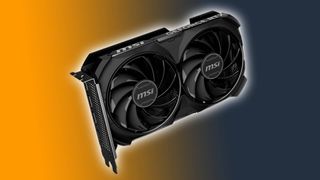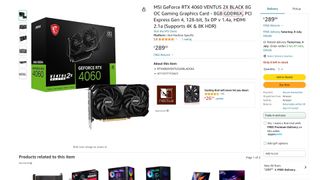Here's why you should double check GPU specs this Prime Day
GPU specs shenanigans!

Prime Day graphics card deals are often cream of the crop, but you might want to slow down a little before clicking 'buy' on June 11. That’s probably just wise advice to follow in general, but as someone that regularly delves into GPU specs for a living, I’d urge you to check whatever Amazon has listed against official product pages. After all, there’s nothing worse than splashing out on pricey gaming PC parts that lack the oomph you were looking for.
Now, it’s worth noting that the issue which sparked this pre Prime Day GPU deal warning sounds incredibly pedantic. Thing is, I’m not a pedant by nature, and I usually default to reading between the lines in most scenarios. However, when it comes to the best graphics cards and their elaborate specs, accuracy is paramount, and the slightest omission, error, or typo can have big buyer consequences.
So, without further ado, here’s the example that has turned me into a harbinger of hardware doom. While preparing for the best Prime Day PC deals, I decided to check in Amazon’s RTX 4060 offerings. I highly doubt that the new GPU on the block will receive any sort of substantial discount, but curiosity kills a lot of this cat’s time, and you never know what’ll end up being bashed by the bargain hammer.
Coincidentally, the top listing on Amazon UK just so happens to be the same card tested in our Nvidia RTX 4060 review, meaning I’ve looked at its specs a zillion times. That’s perhaps the reason why I immediately noticed the word ‘GDDR6X’ in the listing’s title, a term that implies it uses the same speedy VRAM modules as the likes of the RTX 4090.

Just to clarify, the RTX 4060 uses GDDR6 memory modules, and the above information is likely the result of a typo. Again, it’s arguably a pedantic thing to point out, but that extra character lobbed on the end implies you’ll get faster VRAM than many other graphics cards. That’s not to say you’d see a massive performance difference if this class of card did wield the newer standard, but if you’re weighing up whether to buy the RTX 4060 or the RTX 3060 this Prime Day, the typo could sway you under false pretences.
I’m also not entirely into the idea of placing “supports 4K & 8K HDR” in an RTX 4060 listing. You can dabble with UHD resolutions depending on the game, but implying you’ll be able to use the GPU with a 8K gaming monitor is pretty daft. Look, I’m not saying you can’t teach an entry level card cool tricks, and DLSS 3 can help even the 60-class card boost fps to new heights. Nevertheless, mentioning resolutions beyond 1440p feels like a false promise, one that might mislead causal PC players looking to outperform the PS5.
Sign up to the GamesRadar+ Newsletter
Weekly digests, tales from the communities you love, and more
Sure, this is one specific example, and the majority of GPU specs lists on Amazon probably ring true. However, it’s still worth triple checking graphics card listings against official product pages, as it’s ultimately going to help you make a more informed decision. What’s worse is that the above example applies to one of Amazon’s own listings and not a third party, meaning even dealing directly with the storefront isn’t going to save you.
Hopefully, this warning won’t come across as completely pedantic, as even well-versed PC gaming enthusiasts could fall victim to silly typos. I know, having to second guess retailer information shouldn’t be a thing in the first place, but a quick check is going to ensure you get exactly what you pay for.
Today's best graphics card deals
Looking to pick up an entire rig? Check out our best gaming PC picks for build recommendations. Alternatively, why not pick up the best gaming laptop and take your Steam library with you?

I’ve been messing around with PCs, video game consoles, and tech since before I could speak. Don’t get me wrong, I kickstarted my relationship with technology by jamming a Hot Wheels double-decker bus into my parent’s VCR, but we all have to start somewhere. I even somehow managed to become a walking, talking buyer’s guide at my teenage supermarket job, which helped me accept my career fate. So, rather than try to realise my musician dreams, or see out my University degree, I started running my own retro pop culture site and writing about video games and tech for the likes of TechRadar, The Daily Star, and the BBC before eventually ending up with a job covering graphics card shenanigans at PCGamesN. Now, I’m your friendly neighbourhood Hardware Editor at GamesRadar, and it’s my job to make sure you can kick butt in all your favourite games using the best gaming hardware, whether you’re a sucker for handhelds like the Steam Deck and Nintendo Switch or a hardcore gaming PC enthusiast.
Most Popular




